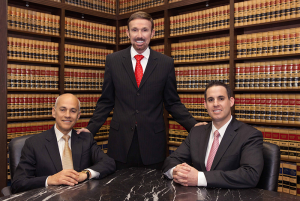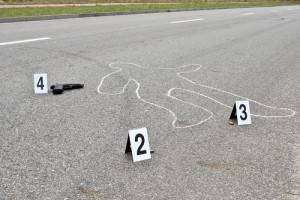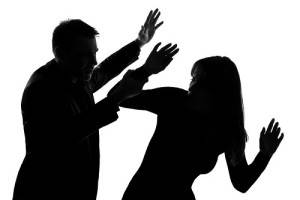3 Strikes Law – Serious or Violent Felony Offense PC 1192.7(c) and PC 667.5
Facing a “Strike Offense” in California?
If you are facing criminal charges for any of the following crimes – either a serious felony offense under PC 1192.7(c) or a violent felony offense under PC 667.5 – you need to be aware that these are considered “strike offenses” according to California’s Three Strikes Law. You should never plead guilty to a strike offense without first retaining the legal services of an experienced strike defense lawyer who can help you determine how you might be able to avoid pleading guilty to a strike offense.
List of Offenses that Can Act as a Strike on your Criminal Record
If you have prior felony convictions on your record and are convicted of a subsequent felony, the Three Strikes Law will only come into play if your previous felony convictions were for serious or violent offenses as listed under California PC 667.5 and PC 1192.7 (c). Here is a list of some of the offenses that can act as a strike on your criminal record:
Serious Felony Offenses [PC 1192.7(c)] and/or Violent Felonies [PC 667.5]
- Murder or voluntary manslaughter (Penal Code section 187)
- Mayhem (Penal Code section 203)
- Rape (Penal Code section 261 and 262)
- Sodomy (Penal Code section 286)
- Oral copulation (Penal Code section 288a)
- Lewd or lascivious (Penal Code section 288)
- Any felony punishable by death or imprisonment in the state prison for life
- Any felony in which the defendant personally inflicts great bodily injury on any person, other than an accomplice, or any felony in which the defendant personally uses a firearm
If a firearm is used in the felony act, the offense may act as a strike on your criminal record. - Attempted murder (Penal Code section 187)
- Assault with intent to commit rape or robbery; (Penal Code section 264.1 and section 211)
- Assault with a deadly weapon or instrument on a peace officer (Penal Code section 241)
- Assault by a life prisoner on a non-inmate (Penal Code section 4500)
- Assault with a deadly weapon by an inmate (Penal Code section 4500)
- Arson (Penal Code Section 451)
- Exploding destructive device with intent to commit murder (Penal Code section 12308)
- Causing bodily injury with explosive or destructive device (Penal Code section 12309)
- Causing death or mayhem with explosive or destructive device (Penal Code section 12310)
- Any burglary of the first degree (Penal Code section 459)
- Robbery or bank robbery (Penal Code section 211)
- Kidnapping (Penal Code section 207)
- Holding of a hostage by a person confined in a state prison (Penal Code section 4503)
- Attempt to commit a felony punishable by death or imprisonment in the state prison for life
- Any felony in which the defendant personally used a dangerous or deadly weapon (Penal Code section 245)
- Selling, furnishing, administering, giving, or offering to sell, furnish, administer, or give to a minor any heroin, cocaine, phencyclidine (PCP), or any methamphetamine-related drug (Health and Safety Code Section 11055)
- Penetration by foreign object (Penal Code section 289)
- Grand theft involving a firearm (Penal Code section 487)
- Carjacking (Penal Code section 215)
- Participation in a criminal street gang (Penal Code section 186.22)
- Assault with the intent to commit mayhem, rape, sodomy, or oral copulation (Penal Code section 220)
Assault with intent can also be considered a “strike” offense in California. - Throwing acid or flammable substances (Penal Code section 244)
- Assault with a deadly weapon, firearm, machine gun, assault weapon, or semiautomatic firearm or assault on a peace officer or firefighter (Penal Code section 245)
- Assault with a deadly weapon against a public transit employee, custodial officer, or school employee (Penal Code section 245.2, 245.3 and 245.5)
- Discharge of a firearm at an inhabited dwelling, vehicle, or aircraft, in violation of (Penal Code section 246)
- Commission of rape or sexual penetration in concert with another person (Penal Code section 264.1)
- Continuous sexual abuse of a child (Penal Code section 288.5)
- Shooting from a vehicle (Penal Code section 12034)
- Intimidation of victims or witnesses (Penal Code section 136.1)
- Criminal threats (Penal Code section 422)
- Committing a felony while using a firearm (Penal Code section 12022.53)
- Possession a weapon of mass destruction a (Penal Code section 11418)
- Conspiracy to commit an offense described in the list above (Penal Code section 182)
Out of State Serious and/or Violent Felony Convictions
It is important to note that out of state convictions count as a strike for purposes of California’s Three Strikes Law so long as they would have qualified as a serious or violent felony if committed in California. This means that even if the out of state conviction is not considered a strike under the laws of that state, it can be treated as a strike offense if it listed under California PC 1192.7 and PC 667.5. This holds true even if the prior out of state conviction was removed from your record under the laws of that state.
Ex Post facto law does not apply to Three Strikes Laws in California
An ex post facto law is any law that retroactively punishes an individual for an act that was not considered illegal when committed, or one that increases the punishment for a criminal offense that was committed prior to the law’s enactment. Under both the California and United States Constitutions, ex post facto laws are considered unconstitutional and subject to appeal.
The California Three Strikes Law allows the court to use evidence of your prior convictions for any serious or violent felony occurring before it went into effect in 1994 in order to increase the punishment associated with any felony conviction after that date. Surprisingly, California criminal courts have upheld the constitutionality of the Three Strikes Law even though it increases the punishment for your current offense by relying on your past conduct. The rationale is that the law doesn’t add any additional punishment for crimes committed prior to 1994, but rather it uses those convictions as a basis to increase your sentence for future crimes committed after the law was put into effect.
California’s Three Strikes Law Defense Attorneys at Wallin and Klarich

With offices in Orange County, Los Angeles, San Diego, San Bernardino, Riverside, Ventura, and Victorville, Wallin & Klarich has over 40 years of experience in successfully representing Southern California residents and defending those who have been prosecuted under California’s Three Strikes Law for Serious Felonies [PC 1192.7(c)].
Drawing from our extensive years of experience, we are available to answer any questions you have and are willing to go the extra mile in your defense.
Call our talented and professional defense attorneys today at (877) 4-NO-JAIL. We will be there when you call.



